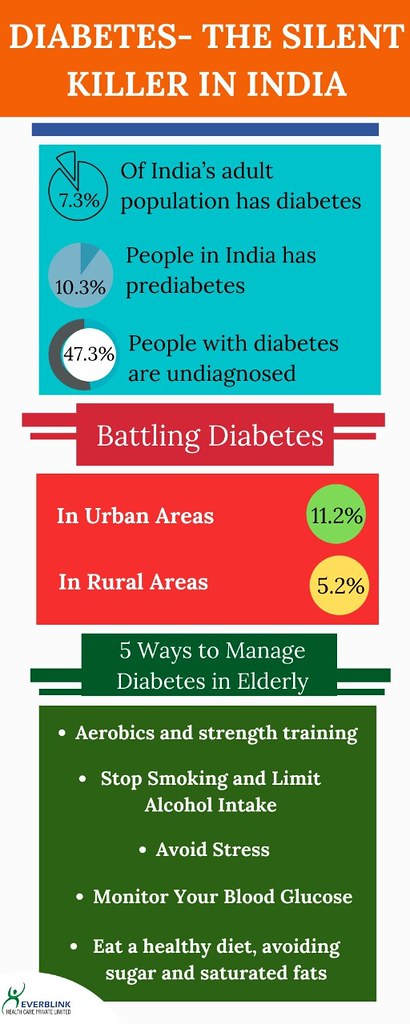


Learn about the chronic disease that plagues millions of Indians and its underlying causes. Diabetes is a condition that affects the body's production and use of insulin, resulting in high blood sugar levels. Find out the difference between type 1 and type 2 diabetes and how it can lead to serious health complications.
Diabetes: A Global Health Crisis
Diabetes is a chronic disease that affects the body's ability to produce or use insulin, leading to elevated blood sugar levels. This condition can have severe implications for overall health, increasing the risk of heart disease, stroke, blindness, kidney failure, and other complications.
Type 1 and Type 2 Diabetes
There are two main types of diabetes: type 1 and type 2. Type 1 diabetes, also known as juvenile diabetes, is an autoimmune disorder in which the pancreas produces little or no insulin. Individuals with type 1 diabetes require lifelong insulin therapy to control their blood sugar levels.
Type 2 diabetes, on the other hand, is characterized by insulin resistance, where the body's cells do not respond properly to insulin. This can lead to elevated blood sugar levels and, eventually, to beta-cell failure in the pancreas, resulting in reduced insulin production. Type 2 diabetes can often be managed through lifestyle modifications, such as diet, exercise, and weight loss, but may also require medication or insulin therapy.
Impact in India
India has the second-highest number of people living with diabetes in the world, with an estimated 77 million individuals affected. The prevalence of diabetes in India is particularly high in urban areas and among the affluent population. Factors such as sedentary lifestyle, unhealthy diet, obesity, and ageing contribute to the high rate of diabetes in the country.
Health Complications
Uncontrolled diabetes can lead to a range of serious health complications, including:
Top 5 FAQs on Diabetes
1. What are the early signs of diabetes?
Common early signs of diabetes include increased thirst, frequent urination, unexplained weight loss, blurred vision, fatigue, and slow-healing sores.
2. Can diabetes be prevented?
Type 1 diabetes cannot be prevented, but type 2 diabetes can be reduced by maintaining a healthy weight, engaging in regular physical activity, and consuming a balanced diet.
3. How is diabetes diagnosed?
Diabetes is diagnosed through a blood test that measures blood sugar levels. An HbA1c test, which measures average blood sugar levels over the past 3 months, is also commonly used.
4. What is the World Diabetes Day?
The World Diabetes Day is observed on November 14th each year to raise awareness of diabetes and its complications worldwide.
5. What are the latest advancements in diabetes treatment?
Research into diabetes treatment is ongoing, with advancements such as continuous glucose monitoring devices, closed-loop insulin pumps, and stem cell therapy showing promise in improving blood sugar control and preventing complications.

In the quest for stronger, luscious hair, we often overlook the importance of nurturing the roots. Fortunately, Ayurveda has long stressed the significance of this practice, which has now been backed by modern science. Studies have shown that herbs like Bhringraj and Amla can activate hair follicles, promoting new growth and delaying greying. Fenugreek, Neem, Hibiscus, and Ashwagandha are also found to be beneficial in strengthening and nourishing the scalp, resulting in thicker and healthier hair.

A college student shares her personal journey of becoming a vegetarian, despite facing challenges and health concerns. She then delves into an ethics class she took, where the concept of marginal cases were discussed. Following an article by philosophy professor Alastair Norcross, she concludes that even though individual action may seem insignificant, refusing to consume factory-farmed meat holds moral significance due to the potential to prevent immense suffering for animals.

On October 24, the global community commemorates World Polio Day to honor the legacy of Dr. Jonas Salk and the efforts of countless individuals and organizations in the fight against polio. This highly contagious and potentially deadly disease, once a widespread epidemic, is now largely preventable thanks to the development of a life-saving vaccine. India's successful eradication of polio serves as a testament to the importance of strong vaccination programs and collaborations in public health initiatives.

As winter arrives in India, so does the hazardous air pollution. Delhi NCR's AQI has already crossed the 400 mark, making it crucial to invest in air purifiers, especially after Diwali. Dyson, Qubo, HomePure, and Philips have launched high-quality air purifiers with advanced features to tackle different types of pollutants and create cleaner indoor air. With prices ranging from Rs 5,000 to Rs 1 lakh, these purifiers are a practical and timely purchase for a healthier living.

In a recent family vlog, Indian celebrity couple Shoaib Ibrahim and Dipika Kakar shared their "natural" hair care routine for their son, using a homemade mask made with rice flour, flax seeds, and coconut oil. However, experts warn that what works for adults may not be suitable for babies, whose sensitive skin and scalp could react to the ingredients. While the ingredients may improve hair texture, they do not necessarily promote hair growth. Instead, a healthy diet and good scalp care are more important in maintaining healthy hair.

A recent consumer study has found multiple brands of soft contact lenses in the U.S. to contain "forever chemicals" that can be harmful to both the body and the environment. The study, conducted by the nonprofit organization Environmental Health Sciences, tested 18 varieties of popular contact lenses and found all of them to contain markers for PFAS. Brands such as Acuvue, Alcon, and CooperVision were among the list of affected products. This news serves as a cautionary lesson on the potential risks of overusing contact lenses.

On the birth anniversary of Dr. APJ Abdul Kalam, the ‘Missile Man’ of India, tributes pour in on social media celebrating his life, vision and impact. A visionary scientist, inspiring leader and true patriot, Dr. Kalam's humility, compassion and constant interaction with students continue to inspire generations. His tireless efforts in defense, science and youth empowerment have strengthened India's path towards self-reliance and his legacy continues to motivate young minds to dream big and work hard for the nation.

Recent studies have found that extreme heat, particularly when combined with high humidity, can have a significant impact on mental health. A study in India showed that when wet bulb temperature exceeded 27°C, the probability of reporting severe depression increased by 0.5%, even when the temperature was slightly lower. This finding is consistent with global reviews that have linked high temperatures to mood disorders, increased hospital admissions for psychiatric conditions, and even elevated suicide risk. The Lancet has also published evidence that rising temperatures worldwide are a growing threat to emotional and cognitive health.

In a meeting with university officials in Udaipur, Rajasthan Governor Hari Bhau Bagde stressed the importance of incorporating India's ancient knowledge traditions into academic research. He highlighted the deep repository of knowledge in India since ancient times and urged scholars and scientists to draw upon this tradition in their work. Bagde also suggested making ancient texts available in university libraries for study and research purposes, in order to shape the intellectual abilities and love for the nation among the younger generation.

John Clarke, Michel H. Devoret, and John M. Martinis have been awarded the 2025 Nobel Prize in Physics for their pioneering research into quantum mechanical tunnelling. Their discovery has opened new possibilities for quantum technologies, and will be formally presented on December 10, the anniversary of Alfred Nobel's death. This announcement follows the tradition of recognizing transformative contributions to science, and the award carries a prestigious prize of 11 million Swedish kronor.